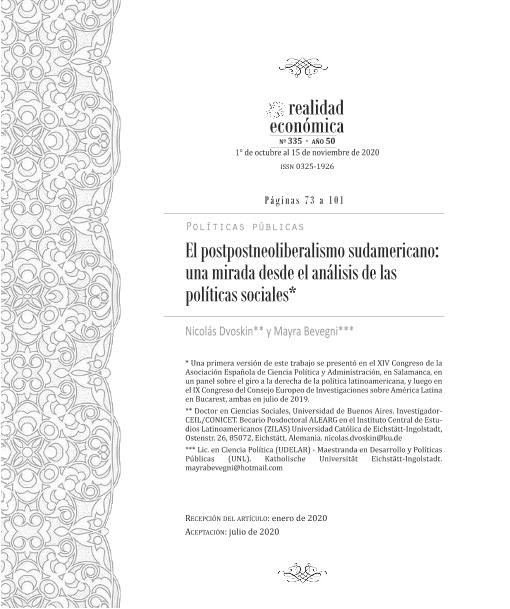Mostrar el registro sencillo del ítem
dc.contributor.author
Dvoskin, Nicolás

dc.contributor.author
Bevegni, Mayra
dc.date.available
2021-08-30T18:50:06Z
dc.date.issued
2020-11-24
dc.identifier.citation
Dvoskin, Nicolás; Bevegni, Mayra; El postpostneoliberalismo sudamericano: una mirada desde el análisis de las políticas sociales; Instituto Argentino para el Desarrollo Económico; Realidad Económica; 50; 335; 24-11-2020; 73-101
dc.identifier.issn
0325-1926
dc.identifier.uri
http://hdl.handle.net/11336/139238
dc.description.abstract
Hace unos quince años Emir Sader propuso el concepto de postneoliberalismo, asumiendo que la era neoliberal en América del Sur había llegado a su fin. Este, crítico del neoliberalismo, coincidía sin embargo con él respecto a la no-búsqueda de homogeneidad social. Quizás como resignación, el postneoliberalismo nunca se propuso la igualdad sino la inclusión, y la política social cumplió un rol muy importante. Esto refiere a objetivos económicos menos pretenciosos, pero a una apertura política mayor: si no tenemos que ser todos iguales, podemos permitir la diversidad. Desde 2015 estamos presenciando un giro conservador tanto en el mundo como en la región. En América del Sur se trata de una avanzada postpostneoliberal, que conjuga un ideario económico ortodoxo con una retórica tradicionalista que se opone a la diversidad. A partir de un análisis de la política social en las nuevas derechas sudamericanas intentamos acercarnos a las nuevas concepciones sobre la relación entre Estado y mercado, para así comprender mejor el significado de las nuevas derechas (postpostneoliberales) en la región.
dc.description.abstract
about fifteen years ago, emir sader proposed the concept of post neoliberalism, assuming that the neoliberal era in south america had come to an end. sader, a critic of neoliberalism, nevertheless agreed with him regarding the non-search for social homogeneity. perhaps as a resignation, post neoliberalism never proposed equality but inclusion, and social policy played a very important role. this refers to less pretentious economic objectives, but to greater political openness: if we do not have to be all equal, we can allow diversity. since 2015 we are witnessing a conservative turn both in the world and in the region. in south america it is a postpostneoliberal advance, which combines an orthodox economic ideology with a traditionalist rhetoric that opposes diversity. From an analysis of social policy in the new south american right-wing, we try to approach the new conceptions about the relationship between the state and the market, in order to better understand the meaning of the new (postpostneoliberal) right-wings in the region.
dc.format
application/pdf
dc.language.iso
spa
dc.publisher
Instituto Argentino para el Desarrollo Económico
dc.rights
info:eu-repo/semantics/openAccess
dc.rights.uri
https://creativecommons.org/licenses/by-nc-sa/2.5/ar/
dc.subject
NEOLIBERALISMO
dc.subject
POSTNEOLIBERALISMO
dc.subject
ESTADO
dc.subject
POLÍTICA SOCIAL
dc.subject
LEGITIMIDAD
dc.subject.classification
Otras Economía y Negocios

dc.subject.classification
Economía y Negocios

dc.subject.classification
CIENCIAS SOCIALES

dc.title
El postpostneoliberalismo sudamericano: una mirada desde el análisis de las políticas sociales
dc.title
South American post post neoliberalism: a view from the analysis of social policies
dc.type
info:eu-repo/semantics/article
dc.type
info:ar-repo/semantics/artículo
dc.type
info:eu-repo/semantics/publishedVersion
dc.date.updated
2021-08-19T19:56:36Z
dc.identifier.eissn
2618-1711
dc.journal.volume
50
dc.journal.number
335
dc.journal.pagination
73-101
dc.journal.pais
Argentina

dc.journal.ciudad
Buenos Aires
dc.description.fil
Fil: Dvoskin, Nicolás. Consejo Nacional de Investigaciones Científicas y Técnicas. Oficina de Coordinación Administrativa Saavedra 15. Centro de Estudios e Investigaciones Laborales; Argentina. Katholische Universität Eichstätt-ingolstadt; Alemania
dc.description.fil
Fil: Bevegni, Mayra. Katholische Universität Eichstätt-ingolstadt; Alemania
dc.journal.title
Realidad Económica

dc.relation.alternativeid
info:eu-repo/semantics/altIdentifier/url/https://ojs.iade.org.ar/index.php/re/article/view/126
Archivos asociados
